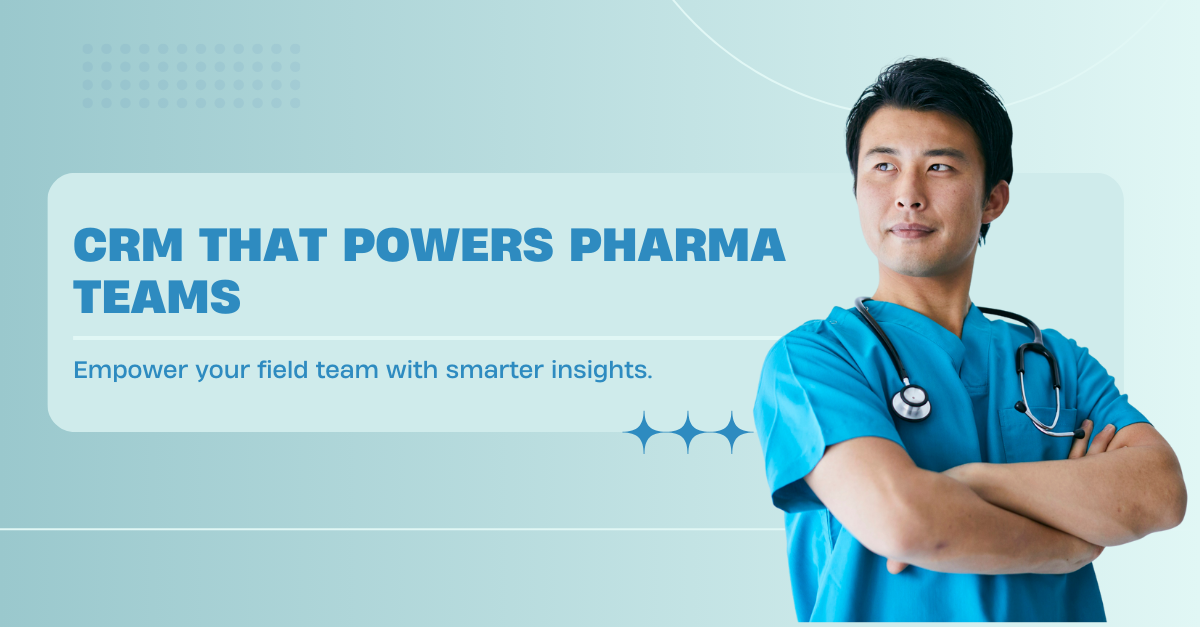Sales CRM for Pharma Companies: Must-Have Features

In the fast-evolving pharmaceutical industry, managing relationships with healthcare professionals, tracking sales activities, and ensuring timely follow-ups can be a daunting task. The traditional methods of maintaining spreadsheets, call logs, and scattered notes are no longer sufficient. Pharma companies require advanced tools that not only streamline operations but also enhance productivity and ensure compliance. This is where a Sales CRM for Pharma comes into play.
A specialized CRM solution acts as the backbone of strong Pharma Field Force Management, helping companies boost efficiency, improve doctor engagement, and accelerate sales growth.
In this article, we’ll explore the essential features every pharma sales CRM should have, why they matter, and how they can help your team stay ahead in a competitive market.
What is a Sales CRM for Pharma?
A Sales CRM for Pharma is a customer relationship management tool designed specifically for pharmaceutical sales teams. Unlike generic CRMs, it addresses the unique challenges of pharma sales, such as:
-
Managing Sample Distribution - Track sample requests, approvals, allocations, and usage digitally. Ensure compliance with industry regulations while maintaining transparency, reducing wastage, and giving managers real-time visibility into sample utilization.
-
Ensuring Regulatory Compliance - Maintain accurate, verifiable logs of all doctor interactions, approvals, and field activities. Simplify audits, meet legal and industry standards, and reduce the risk of non-compliance through automated documentation.
-
Monitoring Sales Performance Across Territories - Analyze rep productivity, sales trends, and territory coverage through dashboards and KPIs. Identify gaps, optimize strategies, and make informed decisions to improve overall field sales performance and target achievement.
-
Optimizing Field Force Efficiency - Boost field team productivity by automating visit planning, suggesting the most efficient routes, and minimizing administrative work. This ensures reps spend more time with doctors, cover more territory, and achieve higher sales outcomes.
-
Tracking Doctor Visits and Interactions - Record detailed notes for every visit, schedule timely follow-ups, and maintain comprehensive histories. A well-structured CRM also enhances Doctor Visit Tracking, ensuring reps maintain consistent, meaningful interactions.
![]()
With a pharma-focused CRM, companies can automate repetitive tasks, gain real-time insights, and enable their sales force to focus on building stronger relationships with healthcare providers, improving productivity, and driving growth.
Why Pharma Companies Need a Dedicated CRM
Pharma sales are complex due to regulations and multi-layered sales cycles. A CRM helps companies solve many Top Challenges in Pharma Field Sales, such as inconsistent engagement, inefficient reporting, and lack of visibility across territories.
-
Improved Doctor Engagement - A pharma CRM lets reps schedule visits, record detailed notes, and track follow-ups systematically. This ensures consistent engagement, stronger relationships with doctors, and more personalized interactions that boost trust and loyalty.
-
Optimized Field Operations - Managers can monitor rep activities, assess territory coverage, and analyze sales patterns through real-time dashboards. This enables informed decision-making, efficient task allocation, and maximized productivity across the field force.
-
Regulatory Compliance - Pharma CRM maintains accurate logs of doctor interactions, sample distributions, and approvals, ensuring adherence to strict regulatory standards. It simplifies audits, reduces compliance risks, and provides verifiable documentation for legal requirements.
-
Enhanced Productivity - By automating administrative work like reporting, data entry, and expense tracking, reps can focus more on doctor visits and meaningful interactions, improving efficiency, boosting sales performance, and reducing time wasted on manual tasks.
-
Data-Driven Decisions - Real-time dashboards and analytics provide insights into sales trends, allowing companies to tweak strategies for maximum results.
Must-Have Features of a Sales CRM for Pharma
When selecting a Sales CRM for Pharma, certain features are critical to ensure it meets the industry’s demands. Let’s dive in to the must-have features:
1. Doctor and Hospital Management
A core feature of any pharma CRM is the ability to maintain a comprehensive database of doctors, clinics, hospitals, and pharmacies. Key capabilities include:
-
Categorization of Doctors:
Classify doctors by specialization, prescription patterns, and influence levels. This helps reps prioritize visits, tailor interactions, and focus on high-value relationships for better sales outcomes. -
Detailed Doctor Profiles:
Maintain comprehensive profiles with contact details, visit history, preferences, and notes. This ensures reps have all essential information to plan visits and personalize interactions effectively. -
Integration with Hospital Systems:
Sync with hospital or clinic systems to get real-time appointment updates. This allows reps to schedule visits efficiently, avoid conflicts, and maximize field productivity.
Having this centralized data helps reps plan visits more effectively and ensures targeted interactions.
2. Visit Planning and Tracking
Effective planning and tracking of doctor visits is critical to maximize field efficiency. A robust pharma CRM should enable reps to schedule visits, log interactions, track follow-ups, and maintain complete visit histories for better engagement:
-
Route optimization : Plan the most efficient travel routes for daily doctor visits, reducing commuting time, minimizing fuel costs, and allowing reps to cover more doctors in less time.
-
Automated scheduling: Automatically schedule visits and send reminders for follow-ups or important tasks, ensuring reps never miss appointments and maintain consistent engagement with doctors.
-
Recording visit details: Digitally capture all visit notes, discussions, prescriptions, and outcomes in real time, providing accurate records for future reference and enabling data-driven decision-making.
-
Real-time tracking of field activities: Monitor rep locations, visit completions, and task progress in real time to ensure accountability, improve supervision, and optimize field operations for maximum productivity.
With these features, pharma reps can focus on meaningful engagements rather than spending time on logistics.
3. Sample and Stock Management
Managing medical samples is a critical aspect of pharmaceutical sales. A CRM should allow:
-
Tracking Sample Requests and Approvals:
Record and monitor every sample request and approval digitally, ensuring timely processing, proper authorization, and clear visibility for managers. -
Monitoring Distribution and Consumption:
Track the allocation and usage of samples in real time, preventing shortages or overuse, and ensuring reps have the right resources for effective doctor engagement. -
Maintaining Compliance Records for Audits:
Keep accurate, verifiable logs of all sample distributions, approvals, and interactions to ensure regulatory compliance and simplify audit processes, reducing legal risks.
Proper sample management ensures that reps are always prepared and prevents wastage or mismanagement.
4. Sales Analytics and Reporting
Data is the backbone of strategic decision-making. A pharma CRM should offer:
-
Real-Time Dashboards for Sales Performance:
Monitor ongoing sales activities instantly with dashboards that display key metrics like visit completions, order values, and target achievement, enabling quick decision-making and proactive management. -
Territory-Wise Sales Reports:
Analyze sales performance across different territories to identify high-performing areas, uncover gaps, optimize coverage, and allocate resources efficiently for maximum revenue impact. -
Prescription Trend Analysis:
Track prescribing patterns and trends for doctors and therapy areas, helping reps tailor their approach, managers plan campaigns, and companies align marketing and field strategies effectively. -
Rep-Wise Productivity Tracking:
Measure individual rep performance on metrics like visits, orders, and targets achieved. Identify strengths and gaps to provide targeted coaching, incentives, and workload adjustments for improved results.
These insights allow managers to identify underperforming areas, recognize top performers, and make informed business decisions.
5. Compliance and Audit Trail
Pharmaceutical sales are subject to stringent regulations. A compliant CRM should include:
-
Recording Every Interaction with Healthcare Professionals:
Digitally capture all doctor visits, calls, and communications to maintain a verifiable record, ensuring transparency, accountability, and easy retrieval for audits or management review. -
Maintaining Logs for Sample Distribution:
Track every sample request, approval, and allocation accurately. Maintain detailed logs to prevent misuse, ensure regulatory compliance, and simplify reporting for audits and oversight. -
Ensuring Adherence to Marketing and Promotional Guidelines:
Monitor all promotional activities and campaigns to ensure reps follow industry rules. Maintain compliance, reduce legal risks, and uphold ethical standards across the pharmaceutical field force.
This not only protects the company legally but also builds trust with healthcare partners.
6. Mobile Accessibility
Field reps spend most of their time outside the office. A mobile-friendly CRM ensures they can:
-
Access Doctor and Hospital Data on the Go:
Reps can retrieve detailed doctor profiles, hospital information, and patient interactions anytime, anywhere, ensuring informed engagement and better decision-making during field visits. -
Update Visit Notes in Real Time:
Reps can log call details, prescriptions, and follow-up actions instantly from their mobile devices, keeping records accurate and up-to-date without returning to the office. -
Submit Reports Without Delays:
Daily reports, order logs, and sample distribution records can be submitted directly via mobile CRM, eliminating paperwork, reducing delays, and enabling managers to act on real-time data.
Mobile access keeps the team connected and responsive, which is crucial in the fast-paced pharma industry.
7. Integration Capabilities
A good Sales CRM for Pharma should seamlessly integrate with other systems such as:
-
Enterprise Resource Planning (ERP) systems : Integrate core business processes like finance, HR, supply chain, and procurement into a unified platform, enabling better coordination, data accuracy, and strategic decision-making across the organization.
-
Inventory and order management software : Track stock levels, manage orders, and streamline replenishment processes digitally. This reduces stockouts, prevents overstocking, and ensures timely delivery to meet customer demands efficiently.
-
Marketing automation tools : Automate campaigns, email sequences, lead nurturing, and customer engagement activities. Save time, improve targeting, and track results to optimize marketing efforts and drive measurable ROI.
Integration ensures smooth data flow across departments, reducing duplication and improving operational efficiency.
8. Territory and Performance Management
Managing large territories and multiple reps can be challenging. A pharma CRM should provide:
-
Territory Assignment and Optimization:
Assign reps to territories strategically, balancing workload and potential. Optimize coverage to ensure all key areas are addressed efficiently, maximizing sales opportunities and reducing overlaps. -
Goal Setting and Performance Tracking:
Set clear sales targets for reps and monitor their progress in real time. Track KPIs, visit completions, and sales achievements to motivate performance and identify areas for improvement. -
Incentive and Commission Management:
Automate calculation of incentives and commissions based on performance metrics. Ensure accuracy, transparency, and timely payouts to keep reps motivated and aligned with business objectives.
By keeping reps accountable and motivated, companies can achieve higher productivity and better coverage.
9. AI-Powered Insights
Modern CRMs leverage AI to provide predictive analytics, helping pharma companies:
-
Forecast Prescription Trends:
Analyze historical data and current patterns to predict future prescriptions. This helps reps and managers plan visits, align marketing efforts, and anticipate demand for better sales outcomes. -
Identify High-Potential Doctors and Regions:
Pinpoint doctors and territories with the highest growth potential. Focus resources strategically to maximize ROI, strengthen relationships, and boost sales in high-value areas. -
Optimize Marketing Strategies:
Use insights from data analytics to refine campaigns, promotions, and engagement tactics. Target the right doctors, therapy areas, and regions to improve efficiency and drive measurable results.
AI insights help in making proactive decisions, rather than reacting to sales data after the fact.
10. Multi-Channel Communication
Effective communication is key to building strong relationships with healthcare professionals. A pharma CRM should enable:
-
Email and SMS Communication from Within the CRM:
Send personalized emails and SMS messages directly from the CRM to doctors and stakeholders, ensuring timely communication, streamlined workflows, and centralized messaging for better tracking. -
Automated Follow-Ups and Reminders:
Schedule follow-ups and set automated reminders for meetings, calls, or tasks. This ensures reps never miss important engagements and maintain consistent relationships with doctors. -
Campaign Tracking to Monitor Engagement:
Track the performance of email and SMS campaigns in real time, measuring open rates, responses, and interactions. Use insights to optimize future campaigns and improve engagement effectiveness.
This ensures consistent communication while reducing manual effort for reps.
Benefits of Implementing a Sales CRM for Pharma
The advantages of using a dedicated pharma CRM are numerous. Here’s how it impacts different aspects of your business:
Higher Sales Efficiency - With optimized routes, automated tasks, and real-time insights, reps can focus on converting leads rather than managing paperwork, reducing wasted time and improving overall productivity across the sales team.
Better Doctor Relationships - CRM data helps personalize interactions, build trust, and improve long-term relationships, allowing reps to provide tailored solutions and follow-ups that strengthen professional engagement.
Accurate Forecasting - Managers can make data-driven decisions and predict sales trends with precision, enabling better planning for inventory, marketing campaigns, and resource allocation.
Regulatory Compliance - Maintaining a proper audit trail reduces legal risks and simplifies regulatory reporting, ensuring all interactions, approvals, and sample distributions meet industry standards consistently.
Increased ROI - By reducing operational inefficiencies and improving sales performance, a pharma CRM contributes to higher revenue, better resource utilization, and measurable returns on investment over time.
A CRM also plays a major role in improving Medical Representative Performance, helping teams stay consistent, accountable, and productive.
Choosing the Right Sales CRM for Pharma
Selecting the right CRM can be overwhelming. Here are some tips to consider:
Industry Focus - Ensure the CRM is specifically designed for pharmaceutical sales, with features that address field force management, sample tracking, and doctor engagement needs.
Ease of Use - A user-friendly interface encourages adoption by field reps, reducing training time and ensuring consistent usage across the team without frustration or errors.
Customizability - Look for solutions that can adapt to your company’s workflows and reporting needs, allowing tailored dashboards, processes, and alerts for unique business requirements.
Scalability - Choose a CRM that can grow with your organization, supporting expanding territories, larger teams, and additional product lines without performance issues or data loss.
Support and Training - Reliable customer support and training resources are crucial for smooth implementation, ensuring your team can resolve issues quickly and maximize CRM adoption efficiently.
Conclusion
In today’s competitive pharmaceutical landscape, leveraging technology is no longer a luxury, it’s a necessity. A dedicated pharma sales tracking helps companies streamline operations, enhance doctor engagement, and drive measurable sales growth.
From visit tracking and sample management to analytics and compliance, a robust pharma CRM empowers your field force to perform efficiently while ensuring regulatory adherence. By investing in the right CRM, pharma companies can stay ahead of the curve, improve productivity, and ultimately achieve better business outcomes.
If your pharma sales team is still relying on spreadsheets and manual processes, it’s time to upgrade to a smart, integrated CRM solution. With the right features in place, your reps can focus on what truly matters, building meaningful relationships and driving results.
Ready to transform your pharma sales operations? Try Delta Sales App today









